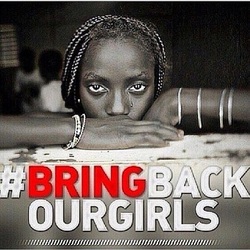|
|
 We are haunted by the stories, we see their faces—those we imagine them to be—when we close our eyes. We pray for their rescue and we go to the grocery store and pay our bills and live our normal lives as if 276 girls weren’t ripped from their dreams and stolen from their beds in rural Nigeria. We watch the video footage on CNN where the terrorists taunt us and attribute their brutality and desecration to Allah as if God would order the abduction and horror and slavery of women, stripped from the safety of their beds. On Friday, April 14 during the night while 276 young women slept on cots and dreamed of completing their education, of drum beat and dance, members of the terrorist Islamist group Boko Haram overpowered the security guards at the school in Chibok, Nigeria. Caught completely unaware, almost 300 terrified girls were torn from their sleep and packed into trucks like cattle and smuggled into the forests of Cameroon. While more than 50 girls managed to escape, some 223 are being held by Boko Haram whose leader boasted to cameras earlier this week that by order of Allah, he intends to sell these girls, to force them into marriage so they can no longer go to school since education for women is sin. The Nigeria government says they are working tirelessly to recover the girls; other nations and international groups are standing with them in aid, including the United States. In Abuja, London, and Los Angeles, citizens are taking to the streets and organizing protests over the abduction and Twitter and Facebook have been inundated with the call to action hashtag #BringBackOurGirls. We wring our hands, our hearts beat fierce with anger and injustice and we wonder, what can we do; separated as we are by oceans and history, politics and Shariah law. We can get involved. We can join the conversation by using the hashtag and we can sign the petition and share with our friends and neighbors the call to U.S. Senators to interject themselves into this tragedy and advocate for these girls. We can raise our voices to compel our elected officials to work on behalf of these innocent victims who are a world away but who are our daughters, our sisters and nieces. We can sew justice. We must recognize that in our own nation and even within the Christian tradition notions of women as inferior, less than and not equal to men still prevail. This is proven in the discrepancy of wages and the restrictions on religious office. In many Christian denominations women are still subject to male rule and domination due to ill-informed study of ancient texts. Is this so different to the impetus for groups such as Boko Haram who derive notions of God ordained female slavery from the pages of the Quran? What is needed is a theology of women that demonstrates women are too created in the image of God; that God is not male, rather, God is some other out of which both maleness and femaleness are derived. What is needed is celebration of the feminine character of the Divine so that it grows in our breasts and informs the justice of our lives. We can pray for freedom. We can call the name of ישוע Y’shua, literally, salvation, deliverance. We can remind ourselves and those who gather in this name, that the God of Scripture whose son bears the name of liberation, who is always on the side of the oppressed, that this God is the one who opened up the sea so that God’s people might walk out of the bondage of slavery into freedom. It is to this God whom we must appeal and to whom we must cling. Freedom and Justice for Our Girls, in Jesus’ name we pray. Amen.
1 Comment
Becca
5/6/2014 05:10:54 am
amen.
Reply
Leave a Reply. |
Subscribe Today for Free GiftBLOG
Archives
June 2019
Categories
All
|

 RSS Feed
RSS Feed